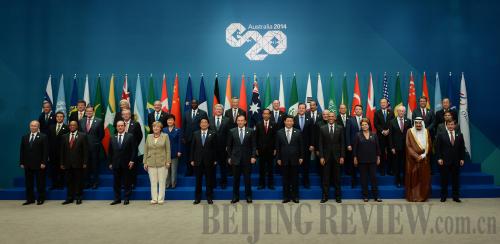|
 |
|
STANDING TOGETHER: G20 leaders pose for a group photo at the Ninth G20 Summit in Brisbane, Australia, on November 15 (MA ZHANCHENG) |
Leaders of the Group of 20 (G20) have promised to work together to lift growth, boost economic resilience and strengthen global institutions upon concluding their summit meeting held in Brisbane, Australia, on November 15-16.
A communiqué of the summit stated that G20 countries would lift their GDP by at least an additional 2.1 percent by 2018. The ambitious goal, if fully met, will add over $2 trillion to the global economy and create millions of jobs, the document said.
"This is the first time that G20 leaders have set a concrete goal for economic growth, and China will play an important role in implementing the action plan," Xiong Aizong, a research fellow of world economics at the Institute of World Economics and Politics under the Chinese Academy of Social Sciences (CASS), told Beijing Review.
As a premier forum for international economic cooperation and decision-making, the G20 comprises 19 of the world's largest advanced and emerging economies plus the EU—accounting for two thirds of the world population, 85 percent of global GDP and 80 percent of global trade.
Commitment to growth
Despite a degree of recovery from the worldwide financial crisis in 2008, global economic growth faces many uncertainties. Major economies need to make concerted efforts to offer new momentum for growth.
Christine Lagarde, Managing Director of the International Monetary Fund (IMF), warned recently that the economic rebound is weaker than the organization envisioned six months ago and that the global economy could be stuck in a sluggish growth rut for a long time.
In the World Economic Outlook report released by the IMF in October, the growth forecast for the world economy was revised downward to 3.3 percent for this year, 0.4 percentage points lower than in the April report.
Against this backdrop, China's pledge to growth will be highly encouraging to G20 leaders, Xiong said.
In his speech at the meeting, Chinese President Xi Jinping said that China's economic growth is an important impetus for global buoyancy. According to estimates made by some international organizations, China is one of the largest contributors to the overall growth strategy of the G20.
"China's contribution to the growth is quite impressive," Xiong said. "As Chinese President Xi pointed out, China's annual increase is equivalent to the economic scale of a moderately developed country."
According to analyses by the IMF, China's economic scale growth in 2014 is $679.4 billion, while that of the United States is $369.5 billion. China's contribution to the world economic scale growth accounts for 27.8 percent, and the United States accounts for 15.3 percent. China and the United States are two major engines of global economic growth.
To meet the goal of 2.1 percent, G20 members will implement over 1,000 measures on lifting investment, expanding trade and boosting employment. China alone pledged to take 134 such measures.
In most years of the last decade, China's economic growth rate exceeded 10 percent. In March, Chinese Premier Li Keqiang in his government work report set the goal of economic growth in 2014 at 7.5 percent.
"In recent years, China has encountered greater challenges in economic development. China needs the slowdown to make a transformation to a healthy and sustainable growth pattern," Xiong said.
| 